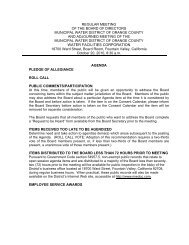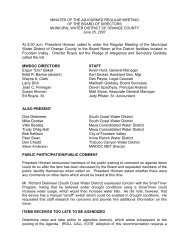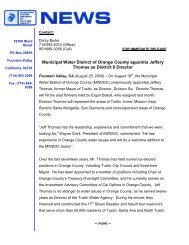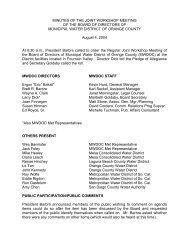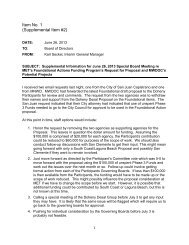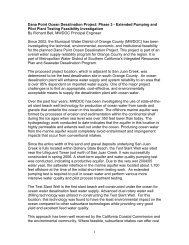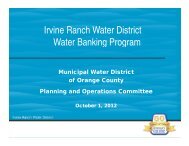UWM Plan - Municipal Water District of Orange County
UWM Plan - Municipal Water District of Orange County
UWM Plan - Municipal Water District of Orange County
Create successful ePaper yourself
Turn your PDF publications into a flip-book with our unique Google optimized e-Paper software.
Section 6<br />
Recycled <strong>Water</strong><br />
Table 6-3 below illustrates the current uses for recycled water within MWDOC’s service<br />
area. The usage is limited to landscape irrigation with a secondary and tertiary treatment<br />
level.<br />
Table 6-3: Current Recycled <strong>Water</strong> Uses (AFY)<br />
User Type Treatment Level<br />
Fiscal Year<br />
Ending<br />
2010<br />
Agriculture<br />
Landscape Secondary/Tertiary 39,642<br />
Wildlife Habitat<br />
Wetlands<br />
Industrial<br />
Total 39,642<br />
6.4. Potential Recycled <strong>Water</strong> Uses<br />
Potential recycled water use within MWDOC’s service area hinges upon many variables<br />
including, but not limited to, economics <strong>of</strong> treatment and distribution system extension<br />
(as well as site retr<strong>of</strong>its), water quality, public acceptance, infrastructure requirements,<br />
and reliability. Recycled water quality, in combination with the tolerance <strong>of</strong> landscaping<br />
to high total dissolved solid levels, plays a large role in whether irrigation with recycled<br />
water is feasible. Recycled water that has TDS levels that constantly or occasionally<br />
exceed the tolerance level <strong>of</strong> specific landscape requirements will result in adverse<br />
impacts to the landscape. Therefore, some users are not able to utilize recycled water<br />
unless TDS levels are held below specific plant-based thresholds.<br />
Even with high identified demands, it is not necessarily economically feasible to provide<br />
recycled water to all potential users. Expansion <strong>of</strong> recycled water systems eventually<br />
reaches a point where returns diminish and higher investments for expansion are not cost<br />
effective. <strong>Water</strong> recycling projects involve collecting and treating wastewater to<br />
applicable standards dependent upon the ultimate end use, storing recycled water for<br />
seasonal use, pipeline construction, pump station installation, and plumbing retr<strong>of</strong>its for<br />
existing end users or dual plumbing systems for new users. Creative solutions to secure<br />
funding, overcome regulatory requirements, institutional arrangements, and public<br />
acceptance are required to <strong>of</strong>fset existing potable demands with potential recycled water<br />
demands.<br />
<strong>Municipal</strong> <strong>Water</strong> <strong>District</strong> <strong>of</strong> <strong>Orange</strong> <strong>County</strong><br />
2010 Regional Urban <strong>Water</strong> Management <strong>Plan</strong><br />
Final<br />
6-8



